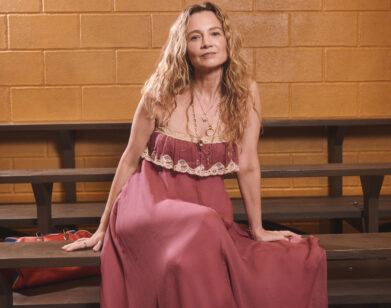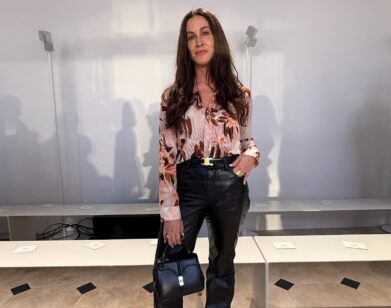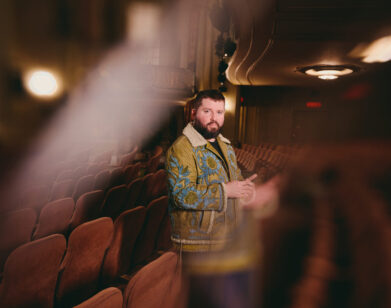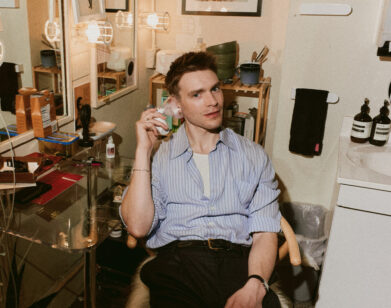Alanis Morissette and Diablo Cody Don’t Give a Shit About the Hipster Vote
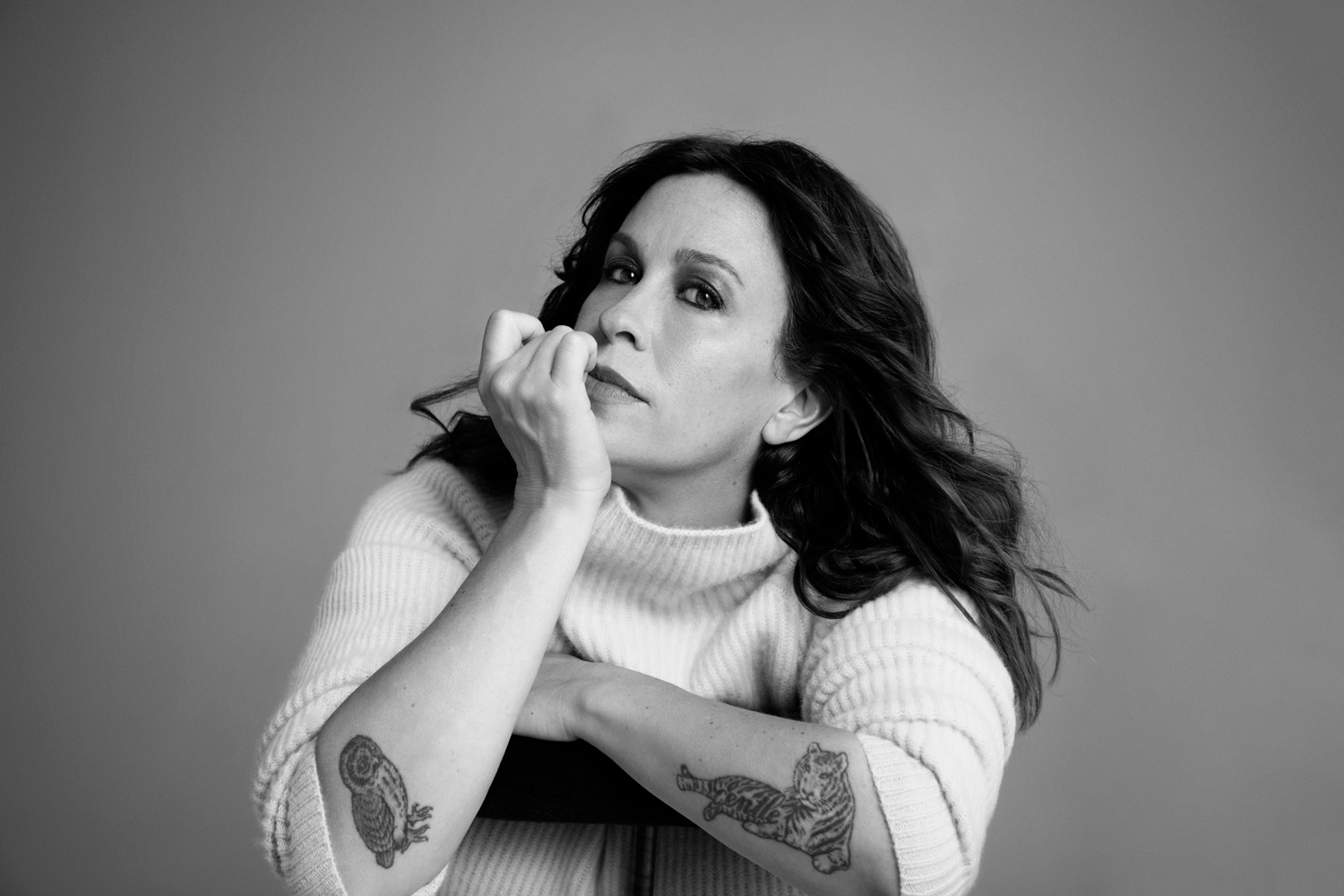
Sweater by Max Mara.
The Smashing Pumpkins. Pearl Jam. Silverchair. In 1995, the alternative music charts were dominated by sad white guys riding the last wave of grunge. So when the Los Angeles rock radio station KROQ took a chance on a 21-year-old Canadian singer named Alanis Morissette, it felt radical. Her first single, “You Oughta Know,” entered the rotation like a heatseeking missile aimed squarely at the shittiest ex in the history of rock-n-roll. Here was a woman who seethed with cathartic rage and pulled no punches in telling her story, on her terms. But that was only the beginning. For the next year, the airwaves belonged to Morissette, who released a parade of hits, from the cleansing ballad “Hand in My Pocket” to the karaoke-ready anthem “Ironic.” As the songs and sales piled up, it became clear that Jagged Little Pill, Morissette’s confessional album, was on its way to becoming an all-time classic. Twenty-five years and seven Grammys later, Morissette has reimagined Jagged Little Pill as a stage musical. With the help of the Oscar-winning writer Diablo Cody and a roster of theatrical veterans, what once stood as an autobiographical expression of trauma and empowerment has been expanded into a panoramic examination of addiction, gender, race, and sexual assault, as seen through the eyes of a suburban Connecticut family. Before the show’s Broadway debut this fall, Morissette and Cody reunited to discuss, among other things, the love that they gave to this thing that they made.
———
DIABLO CODY: First of all, I want to thank you for choosing me for this privilege. I can’t believe I’m interviewing you in this legendary magazine. We’re going to talk about Jagged Little Pill, your iconic album that is now being brought to Broadway this fall as a musical. I think you would agree that it’s been a real trip.
ALANIS MORISSETTE: It’s been a wild ride, one that’s been surprising and heartwarming and enlightening, and also healing. Jagged Little Pill was such an insulated experience, not only the writing of it, but then the touring of it. I felt so solitary, like I was in survival mode. And here we are, years later, and I’m hearing the songs on the stage with objectivity for the first time, with a group of people who are so bright and emotionally literate, and all of a sudden it’s this connected experience. My head is spinning a bit.
CODY: I’ve actually had a similar revelation in terms of this experience, because I’ve spent a lot of time alone in my garage behind a laptop. I think you and I have both discovered that this process of bringing a show to Broadway is so collaborative and communal.
MORISSETTE: And violent. I can’t speak for you, but from the few things you’ve shared with me, and then from my experience in the music industry, so much of the “helpful feedback” is really violent. You create this piece, then you share it with people who may or may not have different vested interests, and you’re getting feedback from one angle or one agenda, and it’s not very “kumbaya.” It actually exacerbates the isolation, because the process of writing is lonely, and then the process of sharing—there’s some emotional violence built in with someone telling you what you should or shouldn’t be doing. Whether we listen to that feedback or not, it’s still being given to us, unsolicited or otherwise.
CODY: Yeah.
MORISSETTE: This is totally different. This is a bunch of people who are invested in us winning, and everyone has the exact same agenda, which is translating this story in a way that resonates with people’s humanity.
CODY: I don’t think that’s typical to the Broadway experience. This is the first Broadway show I’ve ever worked on, but I’ve been told that you frequently have conflicting agendas, and things are not always quite so synchronized behind the scenes. We all agreed on the tone and vibe of the show from the beginning. But that’s because you’re our godmother, and your vibe prevails. Everything is Alanis-y in the best possible way.
MORISSETTE: It’ll take me a while to figure out what that means exactly, but yes, it’s that. When [the producers] Vivek [J. Tiwary] and Arvind [Ethan David] first came to me and threw this idea up the flagpole, my initial thought was, unless this was imbued with what you and I are talking about right now, I wasn’t up for it. It took us almost seven years to bring our group together, and I wasn’t even invested in it happening because I knew that the only way I would want to do it is if it was what we’re doing now. And what we’re doing now is beyond what I imagined in the best-case scenario, so it pays to wait.
CODY: I’m glad that you waited for me.
MORISSETTE: Oh my god, it’s been the best payoff. You’re searingly intelligent and you can handle the complexities of all these characters. And you’re hilarious.
CODY: Oh, man, it’s been the privilege of my life. I was blessed with great source material. I find it fascinating that you were able to create this work when you were so young. It’s hard for me to recognize myself in stuff that I created when I was that age. Do you still feel connected to the woman who wrote those songs?
MORISSETTE: I think my essence has stayed the same, but thank god I’ve grown and had therapy. The only song I’m not sure I stand by is “Not the Doctor,” where I basically say, “Your shit is your shit, and my shit is my shit, and let’s just keep it church and state.” As I get older, and after almost ten years of marriage, I realized that in a relationship, I can participate in someone else’s pain, or histories, and not feel like I’m being dysfunctional or resistant to it. But the rest of the songs, shockingly, I can stand by.
CODY: When you first thought of bringing this raw masterwork of yours to the stage, did you ever worry that it could be cheesy? I’ve always had that perception of Broadway, even as a fan of it.
MORISSETTE: No, because I knew that if it were heading in a direction that made me cringe, I would stop and pull out. If I’m crying, or the hair on my neck is standing up, I couldn’t give a shit what category it falls into. I’ve been snobby in some areas of art, and then I’ve been super cheesy. For me, it’s less about how it’s perceived in the hipster community and more about whether it resonates.
CODY: I’ve long since passed the point where I give a shit about the hipster vote.
MORISSETTE: And by the way, we happen to get it sometimes.
CODY: Did the initial release of Jagged Little Pill isolate you in some way? I can’t imagine the trauma of completely losing your anonymity.
MORISSETTE: Yeah.
CODY: Do you still feel isolated?
MORISSETTE: I don’t feel as isolated. After being in the public eye for a long time, I get why people don’t want to be here. It’s almost like there’s a fork in the road. You either chase it more, or you become so disillusioned that you don’t even want to be here anymore. Prior to fame, I used to think I could write songs about all these horrifying traumas in my life alone in a room, and then I wouldn’t have to deal with relationships and people, you know? But what’s happened over the past 15 years is that I know I have to deal with people if I’m going to be here. I have to learn how to do relationships better. I can’t be unresponsive. I can’t blow people off. When I was younger, my survival strategy was to be super people please-y, to tend and befriend. And then I realized that wasn’t working. I was getting my heart broken at every turn. And then after fame, my survival strategy went to just being aloof. What saved me was a third option: to focus on my relationships—not the ones that are exploitative where I’m being used as a famous person, but the really basic ones, like with my husband and my best friends and my therapist. Growing up has helped.
CODY: Growing up always helps. I’ve never experienced anything like what you’ve experienced, in terms of being in the public eye, but even the smallest taste that I’ve had of being a public figure, you’re given this decision: Do you chase the dragon or do you withdraw? It’s an experience that people don’t understand unless they’ve been through it.
MORISSETTE: I’m still traumatized, but traumatized people often are in the public eye and that re-traumatizes them. I was sold a bill of goods that I think all celebrities are sold at some level: that if I achieve fame, this pain will go away, that this whole story of me not mattering or not existing will be made not true. But that’s not actually what happens. It just exacerbates everything. All of a sudden you’re more subject to being judged, you’re more subject to being abandoned, you’re more subject to being used. I think that’s why a lot of people in the public eye short-circuit. Just because we have this gift or talent, it doesn’t mean we’re equipped with how to deal with it. I didn’t know how to deal with the hyper-version of being watched. I think I looked down for two years straight and didn’t smile at anybody. And I’m a smiley girl.
CODY: I’m about to ask the dreaded question, and I say that because I’ve been asked this question myself: How has motherhood informed your creative process?
MORISSETTE: I used to be a little more high maintenance. Like, if I’m in the studio and there’s some movement I can see in my left eye, I can’t focus. Now, there’s a child sitting on my head and I can still do vocals. My capacity to multitask has gone through the roof.
CODY: I can’t believe I thought I was busy before motherhood.
MORISSETTE: I’m more discerning now. Instead of saying yes to 27 things, I’ll say yes to 23 things. It’s forcing me to rely on collaboration, because I’ll just think, “Hey, I’m actually going to lean on you for this one because I’m leaving at five o’clock.” It’s pulled me out of being a control freak, and puts more focus on hiring and working with the right people. And this musical is a prime example of that.
This article appears in the fall 2019 50th anniversary issue of Interview magazine. Subscribe here.
———
Hair: Marcus Francis at Starworks Artists
Makeup: Rachel Goodwin at Streeters
Production: Amanda Prunesti

